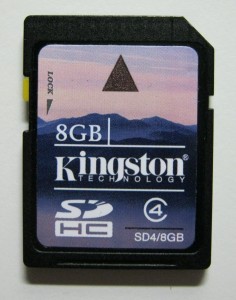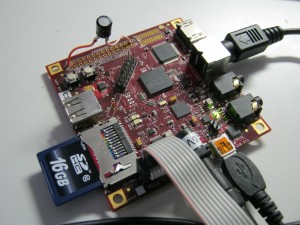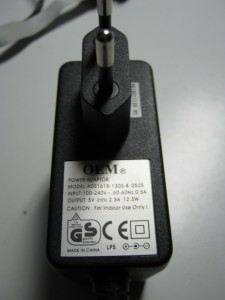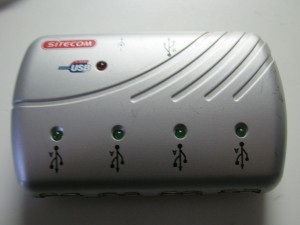Time to test my Raspberry Pi with my new “Power Board”. In order to do so, I’m writing a clean image to my SD card.
[root@hplaptop raspberry_pi]# dd of=/dev/mmcblk0 if=archlinux-hf-2013-07-22.img bs=1M
1870+0 records gelezen
1870+0 records geschreven
1960837120 bytes (2,0 GB) gekopieerd, 317,354 s, 6,2 MB/s
[root@hplaptop raspberry_pi]# sync
Now, something weird is going on. It appears nothing has been written, as when I boot it up, it boots my previous image. It is set to it’s hostname and accepting my username and password. But this is supposed to be a clean, unconfigured instance of ArchLinuxARM. Now, I have been experiencing problems with my laptop’s SD card slot when the laptop is running hot. Now my laptop has been running for hours, but it’s not that hot I think. Anyhow. I’ll remove the existing partitions before I am going to write the image:
[root@hplaptop raspberry_pi]# fdisk /dev/mmcblk0
Opdracht (m voor hulp): o
Aanmaken van een nieuw DOS-schijflabel met schijf-ID 0x67404a92.
Opdracht (m voor hulp): w
De partitietabel is gewijzigd!
Aanroepen van ioctl() om partitietabel opnieuw in te lezen…
Leegmaken van schijfbuffers…
[root@hplaptop raspberry_pi]# ls /dev/mmcblk0*
/dev/mmcblk0 /dev/mmcblk0p1 /dev/mmcblk0p2 /dev/mmcblk0p5
What is going on here? Looking at my dmesg output, there indeed appears to be a problem with my SD slot
[12272.101180] WARNING: at drivers/mmc/host/sdhci.c:838 sdhci_send_command+0xa35/0xd90 [sdhci]()
[12272.101184] Modules linked in: nfsv3 nfs_acl rpcsec_gss_krb5 auth_rpcgss oid_registry nfsv4 fuse cpufreq_powersave uvcvideo videobuf2_vmalloc videobuf2_memops vide
obuf2_core videodev media pata_pcmcia joydev iTCO_wdt coretemp iTCO_vendor_support kvm_intel hp_wmi ppdev sparse_keymap kvm arc4 r852 sm_common nand nand_ecc nand_ids
mtd iwldvm snd_hda_codec_analog mac80211 pcmcia microcode nouveau pcspkr r592 psmouse yenta_socket memstick pcmcia_rsrc serio_raw pcmcia_core evdev mxm_wmi lpc_ich t
tm drm_kms_helper iwlwifi cfg80211 drm i2c_algo_bit i2c_core snd_hda_intel snd_hda_codec snd_hwdep snd_pcm snd_page_alloc snd_timer snd rfkill soundcore parport_pc pa
rport hp_accel fan lis3lv02d e1000e ptp thermal wmi intel_agp acpi_cpufreq input_polldev mperf button pps_core intel_gtt processor ac battery video
[12272.101283] nfs lockd sunrpc fscache ext4 crc16 mbcache jbd2 sd_mod sr_mod cdrom mmc_block sdhci_pci ahci sdhci libahci mmc_core libata firewire_ohci scsi_mod fir
ewire_core crc_itu_t ehci_pci uhci_hcd ehci_hcd usbcore usb_common
[12272.101319] CPU: 1 PID: 7658 Comm: mmcqd/0 Tainted: G W 3.10.6-2-ARCH #1
[12272.101323] Hardware name: Hewlett-Packard HP EliteBook 8530w/30E7, BIOS 68PDV Ver. F.0E 07/31/2009
[12272.101327] 0000000000000009 ffff88013934bbc8 ffffffff814c239c ffff88013934bc00
[12272.101335] ffffffff81055881 ffff8800a26e78e8 ffff8800a26e7958 0000000000000001
[12272.101342] ffff880138b954c0 0000000000000001 ffff88013934bc10 ffffffff8105595a
[12272.101350] Call Trace:
[12272.101359] [] dump_stack+0x19/0x1b
[12272.101366] [] warn_slowpath_common+0x61/0x80
[12272.101373] [] warn_slowpath_null+0x1a/0x20
[12272.101389] [] sdhci_send_command+0xa35/0xd90 [sdhci]
[12272.101396] [] ? strlcpy+0x42/0x60
[12272.101402] [] ? elv_rb_del+0x2a/0x40
[12272.101417] [] sdhci_request+0x147/0x1d0 [sdhci]
[12272.101433] [] mmc_start_request+0x124/0x250 [mmc_core]
[12272.101440] [] ? sg_init_table+0x1a/0x40
[12272.101457] [] mmc_start_req+0x325/0x400 [mmc_core]
[12272.101471] [] mmc_blk_issue_rw_rq+0xe1/0xb50 [mmc_block]
[12272.101487] [] ? __mmc_claim_host+0x131/0x1c0 [mmc_core]
[12272.101501] [] mmc_blk_issue_rq+0x1d3/0x540 [mmc_block]
[12272.101509] [] ? blk_dequeue_request+0x88/0xd0
[12272.101522] [] mmc_queue_thread+0xc3/0x1c0 [mmc_block]
[12272.101535] [] ? mmc_blk_compat_ioctl+0x20/0x20 [mmc_block]
[12272.101543] [] kthread+0xc0/0xd0
[12272.101550] [] ? kthread_create_on_node+0x120/0x120
[12272.101558] [] ret_from_fork+0x7c/0xb0
[12272.101565] [] ? kthread_create_on_node+0x120/0x120
[12272.101570] ---[ end trace c0b8a10a2230b2df ]---
[12272.104585] DMA: Out of SW-IOMMU space for 4096 bytes at device 0000:86:09.1
It seems, nothing is being written to this SD card. Is it my laptop’s SD slot, or is there something wrong with the SD card? Well…. I’ll attempt to use an USB Card Reader in stead. But that thing also refuses with stange messages in smesg
[12585.412195] usb 6-2: new full-speed USB device number 13 using uhci_hcd
[12585.412716] DMA: Out of SW-IOMMU space for 8 bytes at device 0000:00:1d.2
[12585.615960] DMA: Out of SW-IOMMU space for 8 bytes at device 0000:00:1d.2
[12585.818833] usb 6-2: device not accepting address 13, error -11
[12585.818876] hub 6-0:1.0: unable to enumerate USB device on port 2
Rebooting the system doesn’t solve the problem. Even though no SD/MMC related error messages appear in the dmesg output, nothing is being written to the card. The USB card reader appears to be working after reboot. However, I am not sure if the image was written correctly this time. After writing the 2 GB image it appears to be hanging and dmesg shows
[ 1680.563508] INFO: task systemd-udevd:1853 blocked for more than 120 seconds.
[ 1680.563518] "echo 0 > /proc/sys/kernel/hung_task_timeout_secs" disables this message.
[ 1680.563524] systemd-udevd D 0000000000000246 0 1853 127 0x00000004
[ 1680.563535] ffff88004bb8db10 0000000000000086 0000000000014340 ffff88004bb8dfd8
[ 1680.563545] ffff88004bb8dfd8 0000000000014340 ffff88012232b2a0 7fffffffffffffff
[ 1680.563552] ffff88004bb8db18 ffff88004bb8db10 ffff88012232b2a0 ffff88004bb8dad0
[ 1680.563559] Call Trace:
[ 1680.563578] [
[ 1680.563588] [
[ 1680.563595] [
[ 1680.563603] [
[ 1680.563610] [
[ 1680.563617] [
[ 1680.563656] [
[ 1680.563664] [
[ 1680.563671] [
[ 1680.563677] [
[ 1680.563685] [
[ 1680.563693] [
[ 1680.563700] [
[ 1680.563707] [
[ 1680.563714] [
[ 1680.563721] [
[ 1680.563730] [
[ 1680.563739] [
[ 1680.563748] [
[ 1680.563755] [
[ 1680.563762] [
[ 1680.563771] [
However, dd unfroze and appears to have completed normally.
[root@hplaptop raspberry_pi]# dd of=/dev/sdb if=archlinux-hf-2013-07-22.img bs=1M
1870+0 records gelezen
1870+0 records geschreven
1960837120 bytes (2,0 GB) gekopieerd, 367,65 s, 5,3 MB/s
1870+0 records gelezen
1870+0 records geschreven
1960837120 bytes (2,0 GB) gekopieerd, 612,42 s, 3,2 MB/s
Please note the multiple output due running
[root@hplaptop 1000]# while true; do kill -USR1 `pidof dd`; sleep 1; done
in another terminal window.
Anyways, I’m will obtain a new laptop soon. But that doesn’t mean this one has my permission to fall apart now. Well… it has some overheating issues, but I believe a little dusting will solve that. I just don’t feel like opening up this laptop before I have a working spare.
I mean… I have been writing about SD card problems in the past. I believe they’ve appeared especially when my laptop was running hot. But since I’m running it at 800 MHz, heat should not be an issue. However…. the problems with the USB card reader, I don’t know.




